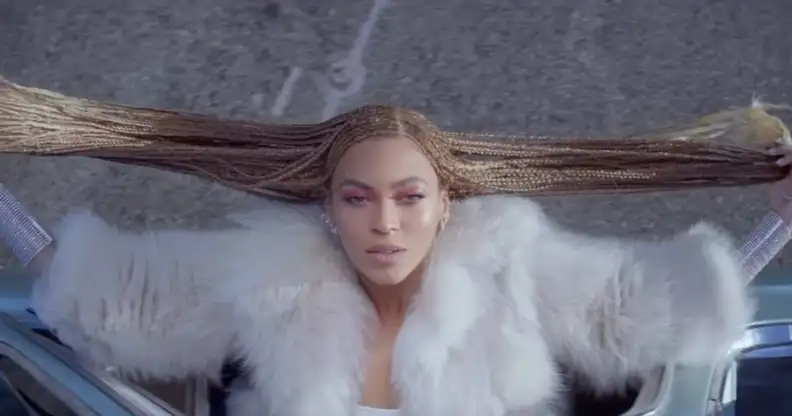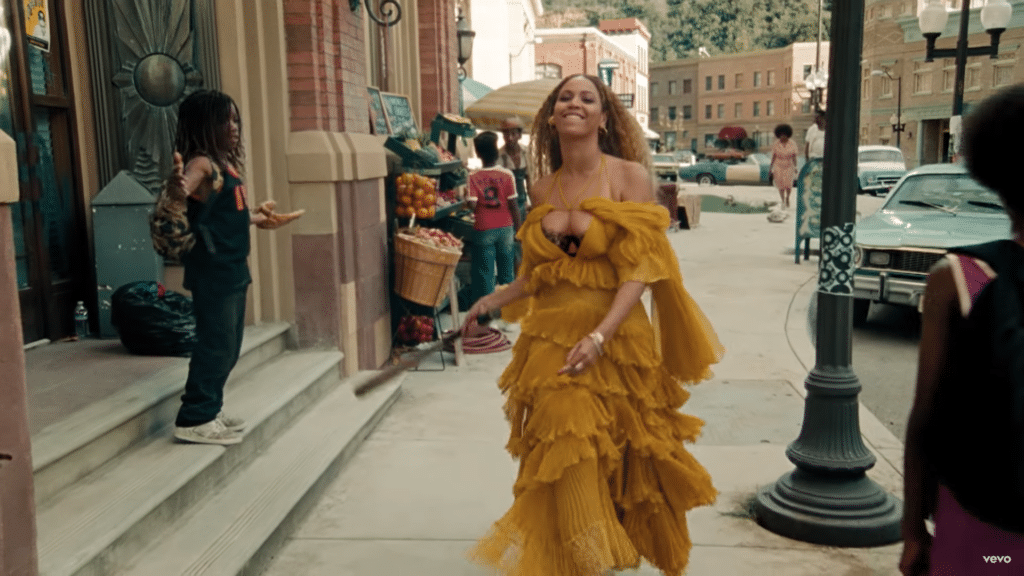Becky with the good hair, Red Lobster and ‘revolutionary Black feminism’: Celebrating Beyoncé’s Lemonade five years on

Formation was a taste of what was to come in Lemonade. (Parkwood)
Lemonade, Beyoncé’s rumination on infidelity, generational trauma and the resilience of Black women, is five years old today.
In 2014, video footage emerged of Solange Knowles punching and kicking her brother-in-law, Jay-Z, in an elevator at the Metropolitan Museum of Art. While a third party held her back, her sister Beyoncé, Jay-Z’s wife, appeared largely calm, and even smiled at photographers who lay in wait outside.
For months, the only acknowledgment given was a statement confirming that the family had “worked through” their issues – and a wry lyric from Beyoncé about s**t going down “when there’s a billion dollars on an elevator”. Rumours suggested the fight was caused by infidelity on Jay-Z’s part, but they remained just that. Until Lemondade.
For her sixth solo album, released on 23 April, 2016, Beyoncé lifted the veil on what had been, until then, a carefully guarded personal life. She told the story of a love lost – but ultimately, found again – connecting her own grief to that felt by her mother, grandmother and ancestors. “The most disrespected person in America is the Black woman,” Malcolm X proclaims through archive footage in the album’s visual accompaniment, a truth Beyoncé unpacks in breathtaking fashion over 12 an hour of music and film – the latter featuring an extensive cast of Black and brown women, including Serena Williams, her daughter Blue Ivy Carter and, through her words, the poet Warsan Shire.

Hold Up. (Parkwood)
“What’s most cathartic about Lemonade,” Miriam Bale wrote in a Billboard piece hailing Lemonade a “revolutionary work of Black feminism”, “is that it dares to make a new canon, finding references in the unphotographed past and future simultaneously, a land of no men”.
As The Guardian’s Syreeta McFadden put it: “The journey in Lemonade centers on a movement for Beyoncé – but really all of us black women by proxy – from pain toward healing and empowerment.” And as her colleague Megan Carpentier noted: “It is not an exaggeration to say that there is no other living musical artist who could ignite such a broad and unavoidable conversation just by releasing a new album.”
Lemonade spawned think-pieces, university courses and entire podcasts dedicated to textual analysis of its themes. It won Grammys (but, infamously, not Album of the Year), a Peabody Award and was named the greatest album by a woman in the 21st century by Rolling Stone. Its lyrics entered the cultural lexicon. A passing reference to the Red Lobster sent sales soaring at the restaurant chain. And half a decade on from its release it continues to inspire conversation, with fans across the world celebrating five years of Lemonade.
5 years ago today Beyoncé released LEMONADE?#5YearsofLEMONADE pic.twitter.com/XFYAZ3k5d0
— robᴮ? (@sirlovedrought) April 23, 2021
Lemonade really was a game changer ? the impact it had, the accolades it collected, the sales it garnered ?? you did that @Beyonce #5yearsofLEMONADE? pic.twitter.com/ArYDOYnmLX— my nigga totoro (@lemonslay) April 23, 2021
It’s so hard choosing my favorite visual and song from Lemonade #5YearsofLEMONADE pic.twitter.com/qCJZfuDFcX— ?ᴮBeyoncéFirstCousinˣ? (@thiccyoncee) April 23, 2021
The best thing about the Lemonade era was Beyoncé tapping into her spiritual side and channeled different goddesses, especially African Deities. She channeled Oshun, Isis, Venus, Kali, etc. Even the album was released during the first moon of Venus!! #5YearsofLEMONADE pic.twitter.com/vquArBLuK5— Name Can't Be Blank (@geloechon) April 23, 2021
5 years ago this album changed my life.
Thank you Queen for giving me the strength, empowerment, bravery and courage that an angry teenager needed.
5 years later you're still giving me the same.
I owe you a lot. ???#5YearsofLEMONADE pic.twitter.com/nhx6BjZdvu— Lea || Nobody ?✨ (@lemonblisss) April 23, 2021
happy 5th birthday #Lemonade literally the best album of all time. from awards and accolades to cultural impact and longevity, you changed the music industry. Beyoncé fully cemented herself as a global icon and grammy’s still shit for not giving her aoty pic.twitter.com/JILsdTG664— scotty (@billkinminaj) April 23, 2021
the lemonade was something totally remarkable#5YearsOfLEMONADE pic.twitter.com/HRLcGlb8bD— vee? (@weepingbbee) April 23, 2021
“What better way to explore black womanhood, marital trauma, and triumph than to create an album that incorporates every major American genre?”#5YearsofLEMONADE
More: https://t.co/kewS8Dvj24 pic.twitter.com/A4VluwasB5— black boy bulletin (he/him) (@blkboybulletin) April 23, 2021

